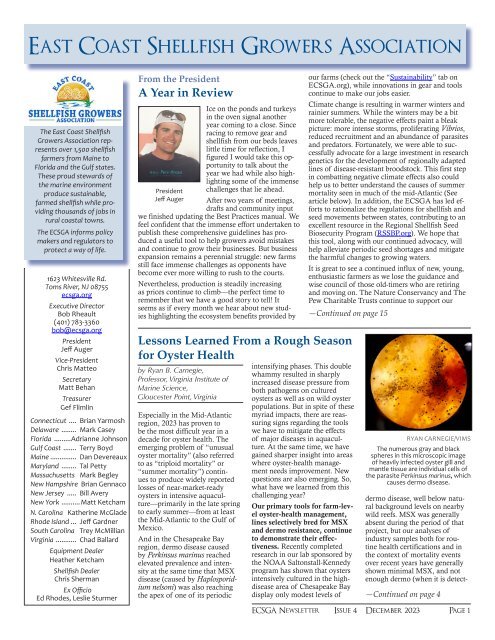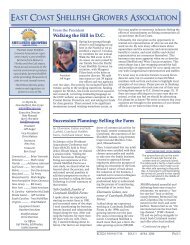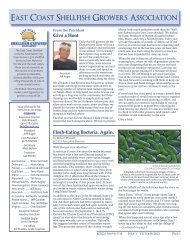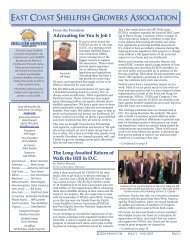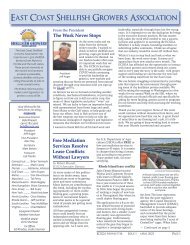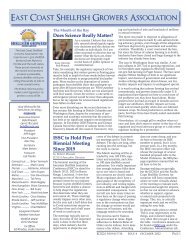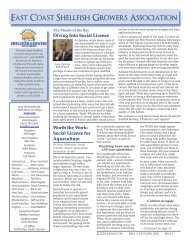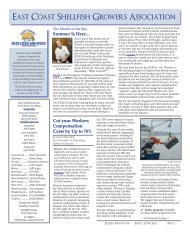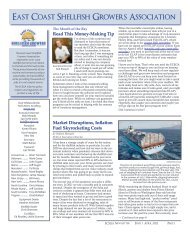East Coast Shellfish Growers Association December 2023 Newsletter
Issue highlights: the year in review from the president, summer mortality in oysters, review of microplastics research, updated best practices manual, fixing the unintended consequences of the Coastal Barrier Act, Mike Oesterling retires as Shellfish Growers of Virginia executive director, Aquaculture Information Exchange goes live, tax tips for growers.
Issue highlights: the year in review from the president, summer mortality in oysters, review of microplastics research, updated best practices manual, fixing the unintended consequences of the Coastal Barrier Act, Mike Oesterling retires as Shellfish Growers of Virginia executive director, Aquaculture Information Exchange goes live, tax tips for growers.
You also want an ePaper? Increase the reach of your titles
YUMPU automatically turns print PDFs into web optimized ePapers that Google loves.
<strong>East</strong> <strong>Coast</strong> <strong>Shellfish</strong> <strong>Growers</strong> <strong>Association</strong><br />
The <strong>East</strong> <strong>Coast</strong> <strong>Shellfish</strong><br />
<strong>Growers</strong> <strong>Association</strong> represents<br />
over 1,500 shellfish<br />
farmers from Maine to<br />
Florida and the Gulf states.<br />
These proud stewards of<br />
the marine environment<br />
produce sustainable,<br />
farmed shellfish while providing<br />
thousands of jobs in<br />
rural coastal towns.<br />
The ECSGA informs policy<br />
makers and regulators to<br />
protect a way of life.<br />
1623 Whitesville Rd.<br />
Toms River, NJ 08755<br />
ecsga.org<br />
Executive Director<br />
Bob Rheault<br />
(401) 783-3360<br />
bob@ecsga.org<br />
President<br />
Jeff Auger<br />
Vice-President<br />
Chris Matteo<br />
Secretary<br />
Matt Behan<br />
Treasurer<br />
Gef Flimlin<br />
Connecticut .... Brian Yarmosh<br />
Delaware ........ Mark Casey<br />
Florida .........Adrianne Johnson<br />
Gulf <strong>Coast</strong> ....... Terry Boyd<br />
Maine .............. Dan Devereaux<br />
Maryland ........ Tal Petty<br />
Massachusetts Mark Begley<br />
New Hampshire Brian Gennaco<br />
New Jersey ..... Bill Avery<br />
New York ..........Matt Ketcham<br />
N. Carolina Katherine McGlade<br />
Rhode Island ... Jeff Gardner<br />
South Carolina Trey McMillian<br />
Virginia ........... Chad Ballard<br />
Equipment Dealer<br />
Heather Ketcham<br />
<strong>Shellfish</strong> Dealer<br />
Chris Sherman<br />
Ex Officio<br />
Ed Rhodes, Leslie Sturmer<br />
From the President<br />
A Year in Review<br />
President<br />
Jeff Auger<br />
Ice on the ponds and turkeys<br />
in the oven signal another<br />
year coming to a close. Since<br />
racing to remove gear and<br />
shellfish from our beds leaves<br />
little time for reflection, I<br />
figured I would take this opportunity<br />
to talk about the<br />
year we had while also highlighting<br />
some of the immense<br />
challenges that lie ahead.<br />
After two years of meetings,<br />
drafts and community input<br />
we finished updating the Best Practices manual. We<br />
feel confident that the immense effort undertaken to<br />
publish these comprehensive guidelines has produced<br />
a useful tool to help growers avoid mistakes<br />
and continue to grow their businesses. But business<br />
expansion remains a perennial struggle: new farms<br />
still face immense challenges as opponents have<br />
become ever more willing to rush to the courts.<br />
Nevertheless, production is steadily increasing<br />
as prices continue to climb—the perfect time to<br />
remember that we have a good story to tell! It<br />
seems as if every month we hear about new studies<br />
highlighting the ecosystem benefits provided by<br />
Lessons Learned From a Rough Season<br />
for Oyster Health<br />
by Ryan B. Carnegie,<br />
Professor, Virginia Institute of<br />
Marine Science,<br />
Gloucester Point, Virginia<br />
Especially in the Mid-Atlantic<br />
region, <strong>2023</strong> has proven to<br />
be the most difficult year in a<br />
decade for oyster health. The<br />
emerging problem of “unusual<br />
oyster mortality” (also referred<br />
to as “triploid mortality” or<br />
“summer mortality”) continues<br />
to produce widely reported<br />
losses of near-market-ready<br />
oysters in intensive aquaculture—primarily<br />
in the late spring<br />
to early summer—from at least<br />
the Mid-Atlantic to the Gulf of<br />
Mexico.<br />
And in the Chesapeake Bay<br />
region, dermo disease caused<br />
by Perkinsus marinus reached<br />
elevated prevalence and intensity<br />
at the same time that MSX<br />
disease (caused by Haplosporidium<br />
nelsoni) was also reaching<br />
the apex of one of its periodic<br />
intensifying phases. This double<br />
whammy resulted in sharply<br />
increased disease pressure from<br />
both pathogens on cultured<br />
oysters as well as on wild oyster<br />
populations. But in spite of these<br />
myriad impacts, there are reassuring<br />
signs regarding the tools<br />
we have to mitigate the effects<br />
of major diseases in aquaculture.<br />
At the same time, we have<br />
gained sharper insight into areas<br />
where oyster-health management<br />
needs improvement. New<br />
questions are also emerging. So,<br />
what have we learned from this<br />
challenging year?<br />
Our primary tools for farm-level<br />
oyster-health management,<br />
lines selectively bred for MSX<br />
and dermo resistance, continue<br />
to demonstrate their effectiveness.<br />
Recently completed<br />
research in our lab sponsored by<br />
the NOAA Saltonstall-Kennedy<br />
program has shown that oysters<br />
intensively cultured in the highdisease<br />
area of Chesapeake Bay<br />
display only modest levels of<br />
our farms (check out the “Sustainability” tab on<br />
ECSGA.org), while innovations in gear and tools<br />
continue to make our jobs easier.<br />
Climate change is resulting in warmer winters and<br />
rainier summers. While the winters may be a bit<br />
more tolerable, the negative effects paint a bleak<br />
picture: more intense storms, proliferating Vibrios,<br />
reduced recruitment and an abundance of parasites<br />
and predators. Fortunately, we were able to successfully<br />
advocate for a large investment in research<br />
genetics for the development of regionally adapted<br />
lines of disease-resistant broodstock. This first step<br />
in combatting negative climate effects also could<br />
help us to better understand the causes of summer<br />
mortality seen in much of the mid-Atlantic (See<br />
article below). In addition, the ECSGA has led efforts<br />
to rationalize the regulations for shellfish and<br />
seed movements between states, contributing to an<br />
excellent resource in the Regional <strong>Shellfish</strong> Seed<br />
Biosecurity Program (RSSBP.org). We hope that<br />
this tool, along with our continued advocacy, will<br />
help alleviate periodic seed shortages and mitigate<br />
the harmful changes to growing waters.<br />
It is great to see a continued influx of new, young,<br />
enthusiastic farmers as we lose the guidance and<br />
wise council of those old-timers who are retiring<br />
and moving on. The Nature Conservancy and The<br />
Pew Charitable Trusts continue to support our<br />
—Continued on page 15<br />
RYAN CARNEGIE/VIMS<br />
The numerous gray and black<br />
spheres in this microscopic image<br />
of heavily infected oyster gill and<br />
mantle tissue are individual cells of<br />
the parasite Perkinsus marinus, which<br />
causes dermo disease.<br />
dermo disease, well below natural<br />
background levels on nearby<br />
wild reefs. MSX was generally<br />
absent during the period of that<br />
project, but our analyses of<br />
industry samples both for routine<br />
health certifications and in<br />
the context of mortality events<br />
over recent years have generally<br />
shown minimal MSX, and not<br />
enough dermo (when it is detect-<br />
—Continued on page 4<br />
ECSGA <strong>Newsletter</strong> Issue 4 <strong>December</strong> <strong>2023</strong> Page 1
A Critical Review of<br />
Microplastics in <strong>Shellfish</strong><br />
by Robert Rheault,<br />
ECSGA Executive Director<br />
As someone who has been questioning the<br />
hype about microplastics (MP) in shellfish<br />
for years, I found that “A Critical Assessment<br />
of Microplastics in Molluscan <strong>Shellfish</strong><br />
with Recommendations for Experimental<br />
Protocols, Animal Husbandry, Publication,<br />
and Future Research,” by Sandra E. Shumway<br />
et al. made for a very enjoyable read.<br />
For those of you who don’t have the patience<br />
to wade through 133 pages, following are<br />
some highlights.<br />
Shumway and her team were highly critical<br />
of the deluge of slapdash research published<br />
in the field, resulting in “a chaotic and cluttered<br />
literature rife with inappropriate methodologies,<br />
poor experimental protocols, misinterpreted<br />
results, overstated significance,<br />
and subsequent damaging media stories.”<br />
Shumway’s team reviewed more than 750<br />
publications and criticized the tendency of<br />
many authors to reach conclusions about<br />
impacts that are purely speculative and not<br />
justified by the research. The authors make<br />
sound recommendations on improving<br />
methodology and using appropriate sampling<br />
techniques and instrumentation, and<br />
present guidelines for quality control. The<br />
team also cites many shoddy studies using<br />
husbandry techniques seemingly designed to<br />
kill the experimental animals.<br />
Shumway et al. do an admirable job dispelling<br />
the many myths about the impacts of<br />
MP in shellfish, noting that the numbers of<br />
particles detected in samples are generally<br />
low, and that drawing conclusions about<br />
insignificant variations or trends is<br />
—Continued on page 4<br />
<br />
<br />
<br />
<br />
<br />
<br />
<br />
<br />
<br />
<br />
<br />
<br />
<br />
<br />
SCALABLE ALGAE PRODUCTION<br />
With control in the palm of your hand<br />
• Indoor / Outdoor Use<br />
• Microalgae and Macroalgae<br />
• Simple, Modular Assembly<br />
• Remote Wi-Fi Control for pH,<br />
Temperature, and LED’s<br />
• High Productivity<br />
• Cost Effective Solution<br />
www.purebiomass.org<br />
ECSGA <strong>Newsletter</strong><br />
Page 2 Issue 4 <strong>December</strong> <strong>2023</strong>
Best Practices Manual Gets an Update<br />
by Robert Rheault,<br />
ECSGA Executive Director<br />
After two years of effort involving<br />
dozens of interviews and<br />
workshops, along with hundreds of<br />
hours of editing and fact-checking,<br />
we are excited to unveil a revamped<br />
ECSGA Best Practices Manual.<br />
Building on the 2010 version, this<br />
<br />
update contains: a whole new<br />
section on the management and<br />
handling of floating gear, multiple<br />
embedded links, tons of info on<br />
new gear types, new photos, a<br />
revised bibliography and more. We<br />
sincerely hope that growers will<br />
embrace these grower-suggested<br />
practices as a way to head off government-mandated regulations.<br />
Inside you will find plenty of helpful information to guide you<br />
through the various ways you can protect the environment while<br />
maintaining good relations with the other users of the commons and<br />
with your shoreside neighbors. The manual includes sections on site<br />
selection, being a good neighbor, options for anchoring floating gear,<br />
tips on storm preparation, fouling control, bird issues, record keeping<br />
and a robust discussion of regulations.<br />
We also completely rebuilt the tool that creates your personalized,<br />
farm-specific Best Practices document as an easy-to-use, web-based<br />
form. The Best Practices Form lists all the BP options from the<br />
manual as a series of check boxes, allowing you to select those<br />
pertinent to your farm and to skip sections that are not relevant<br />
to your operation. It walks you through the steps to create a final<br />
MS Word document that you can then tweak, trim, format, add<br />
images to, embellish or personalize however you want. You can<br />
turn this customized farm plan<br />
into a detailed presentation<br />
for permitting, use it for<br />
employee training or turn it<br />
into a streamlined marketing<br />
document.<br />
It does not take long to complete<br />
the form, and we expect that<br />
most growers will not have to<br />
make significant operational<br />
changes to follow the relevant<br />
best practices. New growers<br />
should find the manual and form<br />
very helpful, and we expect that<br />
some old hands may also learn a<br />
few things by going through the<br />
exercise.<br />
Since we released the manual just<br />
a few weeks ago we have clocked<br />
over 100 downloads, and many<br />
growers have already completed<br />
their customized, farm-specific<br />
BP documents.<br />
You can download ECSGA’s<br />
revised Best Practices Manual at<br />
ecsga.org/best-practices.<br />
This project was made<br />
possible through support<br />
provided by The Nature<br />
Conservancy’s SOAR <strong>Shellfish</strong><br />
<strong>Growers</strong> Resiliency Fund.<br />
<br />
<br />
<br />
<br />
ANCHORING SOLUTIONS FOR OYSTER FARMING<br />
FLOATING BAG & CAGE SYSTEMS<br />
WHY USE PLATIPUS ANCHORS:<br />
• Fast and easily installed from a boat or shallow water<br />
• Can be installed using hand-held tools<br />
• Once installed the anchor is post-tensioned and immediately serviceable<br />
• On-site technical and installation support as needed<br />
• Anchor assemblies made in Raleigh, NC USA<br />
Sustainable Oyster Farming Systems<br />
516 US Highway 70 West<br />
Havelock, NC, 28532<br />
tel: 1-888-412-8948<br />
email: sales@submurge.com<br />
www.submurge.com<br />
T: (919) 662-0991 E: CIVILS@PLATIPUS.US<br />
W: WWW.PLATIPUS.US<br />
ECSGA <strong>Newsletter</strong> Issue 4 <strong>December</strong> <strong>2023</strong> Page 3
—Continued from page 1<br />
Summer Mortalities<br />
ed at all) to be causing extraordinary<br />
mortality. In short, and<br />
contrary to recent suggestions in<br />
the press, these pathogens have<br />
been substantially subdued by<br />
selective breeding. But we have<br />
known this for a while.<br />
At the same time, these major<br />
pathogens remain capable of<br />
causing significant mortality.<br />
While lines selected for disease<br />
resistance can substantially reduce<br />
MSX and dermo impacts,<br />
we are finding very high prevalences<br />
and intensities of infection<br />
in oysters lacking the same<br />
level of disease resistance: wild<br />
seed relayed to disease-intense,<br />
Harvest Healthier<br />
with<br />
higher salinities from lower salinities,<br />
and hatchery lines selected<br />
for low-salinity tolerance but<br />
grown in disease-intense areas.<br />
It is very important that growers<br />
consider the relative disease<br />
risks in their growing areas, and<br />
that they consult their regional<br />
shellfish pathologists for perspective.<br />
Disease-intense waters<br />
really require the use of diseaseresistant<br />
seed.<br />
But which seed to grow in<br />
which location or aquaculture<br />
context is not always obvious.<br />
The relative field performance of<br />
different hatchery lines in commercial<br />
aquaculture contexts is<br />
not well established. Beyond the<br />
challenges of MSX and dermo,<br />
and in addition to Seaside<br />
Organism (also referred to as<br />
RYAN CARNEGIE/VIMS<br />
A pathology sample from a case of<br />
the enigmatic “summer mortality”<br />
showing the excellent condition<br />
typical of affected oysters.<br />
SSO, a disease caused by Haplosporidium<br />
costale in the highest<br />
salinities), “summer mortality”<br />
is a major contemporary issue<br />
that may well relate more to<br />
general oyster resilience than to<br />
any interaction with a specific<br />
pathogen. It may be viewed<br />
(hypothetically) as reflecting the<br />
complex interaction between<br />
a challenging and changing<br />
marine environment, the unique<br />
nuances of husbandry on a specific<br />
farm, and the genetics and<br />
physiology of the oysters being<br />
cultured on that farm.<br />
Differences in oyster genetics<br />
are fundamental to summer<br />
mortality in Pacific oyster<br />
systems. We should consider<br />
whether genetics (such as inbreeding)<br />
plays a similar role in<br />
summer mortality in the <strong>East</strong>ern<br />
oyster. Alternatively, oysters<br />
selected specifically for MSX<br />
and dermo resistance may not be<br />
adequately selected for resilience<br />
in the more complex stress regimes<br />
presented by commercial<br />
aquaculture farms. We need a<br />
better understanding of the field<br />
performance of different genetic<br />
lines in different commercial<br />
culture contexts. We also need<br />
a better understanding of how<br />
mortality is influenced by environmental<br />
variation across the<br />
vast geography in which summer<br />
mortality is affecting farmers.<br />
This knowledge will be essential<br />
to ultimately managing summer<br />
mortality, not least by allowing<br />
farms to make more informed,<br />
data-driven choices on which<br />
seed to grow.<br />
We should be highly optimistic<br />
about the future of oyster<br />
and clam aquaculture, in large<br />
part because of the success we<br />
continue to have in managing<br />
major pathogens. Thanks to selective<br />
breeding, we are already<br />
effectively managing MSX and<br />
dermo. As we pivot to establishing<br />
greater resilience for animals<br />
cultured in more stressful marine<br />
systems, we will need to find<br />
new ways for science to work<br />
closely with industry to understand<br />
and model environmental<br />
change and oyster performance.<br />
This work must be carried out<br />
on commercial aquaculture<br />
farms as well as in lab settings.<br />
Aquamesh® is the only wire mesh fabric in the world<br />
specifically engineered for ocean use and designed<br />
to withstand the harshest subsea conditions.<br />
• Longest lasting PVC coated wire mesh<br />
• Galvanized after welding to resist corroding<br />
• Resists algae and fouling<br />
Aquamesh® | Manufactured by Riverdale Mills<br />
riverdale.com | sales@riverdale.com | 1.800.762.6374<br />
ECSGA <strong>Newsletter</strong><br />
Page 4 Issue 4 <strong>December</strong> <strong>2023</strong><br />
—Continued from page 2<br />
Microplastics<br />
irresponsible. They point out<br />
that there are “no convincing<br />
data to support any negative<br />
claims being made with regard<br />
to the contributions that the<br />
aquaculture industry may be<br />
making to the levels of MP in<br />
the environment. Further, there<br />
are no data to support claims<br />
that there are negative impacts<br />
on the shellfish crops or the environment,<br />
or that the extremely<br />
low levels of MP accumulated<br />
in the shellfish pose any threat<br />
to human health.”<br />
It is not too surprising that filterfeeding<br />
bivalves capture microplastic<br />
particles from the water,<br />
since they are well adapted to<br />
living in waters laden with inert<br />
and organic particles of all sizes.<br />
Notably, many are also adept at<br />
rejecting inedible particles and<br />
don’t even put them into their<br />
digestive tracts. Inert, non-food<br />
particles that do get ingested are<br />
rapidly expelled. What I found<br />
surprising was how few particles<br />
were actually noted in most of<br />
these studies. Looking at my<br />
social media feed I can say with<br />
some confidence that these overhyped<br />
claims of adverse MP<br />
impacts are hurting our markets.<br />
The authors conclude that,<br />
“There are currently no reliable<br />
data to indicate that MP associated<br />
with shellfish have any<br />
impact on human health, and<br />
it is highly unlikely that the extremely<br />
low levels of MP reported<br />
in bivalve molluscs globally<br />
presents any significant risk to<br />
either the shellfish or to human<br />
health. In reality, the number<br />
of MP found in shellfish is far<br />
outweighed by the MP inhaled<br />
and consumed by humans in<br />
everyday life.”<br />
“A Critical Assessment of Microplastics<br />
in Molluscan <strong>Shellfish</strong>”<br />
is available for download for a<br />
limited time at doi.org/10.1080/<br />
23308249.<strong>2023</strong>.2216301.
Unintended<br />
Consequences of<br />
<strong>Coast</strong>al Barrier Act<br />
Join the ECSGA<br />
Listserv<br />
Listserv access is<br />
now open to all. Get<br />
timely news, grant<br />
info, tips, answers to<br />
growers’ questions<br />
and more. Just click on<br />
the Listserv button on<br />
ECSGA.org to sign up.<br />
by Robert Rheault,<br />
ECSGA Executive Director<br />
When the ECSGA was Walking<br />
the Hill in March <strong>2023</strong> we met<br />
with congressional offices that<br />
were trying to reauthorize the<br />
<strong>Coast</strong>al Barrier Resources Act<br />
of 2005. The law was enacted<br />
to encourage conservation of<br />
vulnerable coastal barriers by<br />
preventing homeowners and<br />
developers from using government-subsidized<br />
insurance<br />
and disaster-relief programs<br />
to rebuild after storms destroy<br />
buildings in these areas. The<br />
current re-authorization effort is<br />
being undertaken to add more<br />
mapped areas, but we saw this<br />
as an opportunity to rectify an<br />
unintentional oversight.<br />
FEMA.GOV<br />
Since mapped areas do not allow<br />
federal funding that would<br />
support private or commercial<br />
activity, an unintended consequence<br />
of the act is to disqualify<br />
shellfish farmers in these areas<br />
from access to programs such<br />
as FSA disaster relief or USDA<br />
Rural Development loans and<br />
incentives. Paul Zajicek of the<br />
National Aquaculture <strong>Association</strong><br />
had alerted me to a situation<br />
where a Florida shellfish<br />
farmer was denied an FSA<br />
loan a few years ago because<br />
he had leases near such a zone.<br />
While we don’t think it has<br />
been common for the U.S. Fish<br />
and Wildlife Service (FWS) to<br />
deny the use of these programs<br />
by shellfish farmers, we were<br />
confident that it was not the intent<br />
of the act to block shellfish<br />
farms, which have been shown<br />
to preserve biodiversity, enhance<br />
fisheries and stabilize sediments.<br />
Since many farms are located in<br />
these mapped areas, it seemed<br />
worth a try to insert an exemption<br />
for aquaculture growers.<br />
—Continued on page 8<br />
Answers in Hours, Not Days<br />
New Domoic Acid (ASP) ELISA Test Kit<br />
• Broadest sensitivity (down to 6.5 parts per trillion)<br />
• Quantitative answers in < 2 hours<br />
• Test shellfish or seawater<br />
• Proven ELISA technology<br />
• Ready to use standards – no serial dilution required<br />
• Requires only basic lab skills and equipment<br />
See our Algal Toxin and Marine Biotoxin<br />
test kits at www.abraxiskits.com!<br />
Gold Standard Diagnostics Horsham, Inc., Warminster, PA, USA | P: 215-357-3911<br />
ECSGA <strong>Newsletter</strong> Issue 4 <strong>December</strong> <strong>2023</strong> Page 5
ECSGA AD Square bag 11_28_23 Draft 3.pdf 1 11/28/<strong>2023</strong> 1:40:46 PM<br />
C<br />
M<br />
Y<br />
CM<br />
MY<br />
CY<br />
CMY<br />
K<br />
ECSGA <strong>Newsletter</strong><br />
Page 6 Issue 4 <strong>December</strong> <strong>2023</strong>
SGV Ex. Dir. Mike Oesterling Retires<br />
by Ben Stagg, Executive Director, <strong>Shellfish</strong> <strong>Growers</strong> of Virginia<br />
Michael J. Oesterling (affectionately<br />
known as Mike O.) brought<br />
his 11-year tenure as executive<br />
director of the <strong>Shellfish</strong> <strong>Growers</strong><br />
of Virginia (SGV) to a close<br />
when he retired in June. After<br />
earning degrees in biology from<br />
the University of Miami and in<br />
zoology from the University of<br />
Florida, he enjoyed a long career<br />
working at the Virginia Institute<br />
of Marine Science (VIMS),<br />
where he co-authored the marine<br />
resource report, “Best Management<br />
Practices for the Virginia<br />
<strong>Shellfish</strong> Culture Industry.” He also<br />
promoted new and exciting concepts<br />
for the seafood industry while<br />
serving on the Fisheries Resources<br />
Grant committee at VIMS.<br />
As the first SGV executive director,<br />
Mike O. was instrumental in starting the<br />
organization back in 2012. He also served<br />
as chair of the Virginia Marine Products<br />
Board, where he presided over the marketing<br />
of Virginia’s seafood industry. He<br />
shared his extensive knowledge and guidance<br />
while sitting on the <strong>Shellfish</strong> Management<br />
Advisory Committee at the Virginia<br />
Marine Resources Commission and the<br />
Aquaculture Advisory Board at the Virginia<br />
Department of Agriculture and Consumer<br />
Services. At the national level, Mike O.<br />
enhanced the Commonwealth’s<br />
standing in the shellfish industry<br />
while serving on the National<br />
Aquaculture <strong>Association</strong>’s Marine<br />
Aquaculture Committee.<br />
He was a frequent attendee of<br />
Interstate <strong>Shellfish</strong> Sanitation<br />
Conference (ISSC) biennial meetings,<br />
and served on several ISSC<br />
committees. Throughout his<br />
career, Mike O. fostered bipartisan<br />
consensus with legislators,<br />
nonprofit advocacy organizations,<br />
government organizations,<br />
shellfish farmers and farming<br />
interests, and other stakeholders<br />
to pass numerous pieces of natural<br />
resources legislation. He was<br />
part of the team that successfully<br />
named November as Virginia<br />
Oyster Month in 2022.<br />
Mike O. continues to provide<br />
advice and wisdom to new SGV<br />
Executive Director Ben Stagg,<br />
and lent a hand one last time by<br />
serving on the planning committee<br />
to help organize the <strong>2023</strong><br />
Virginia Aquaculture Conference<br />
(sponsored by VIMS) in Newport<br />
News, Virginia. You can drop<br />
Mike O. a line thanking him for<br />
his lifelong dedication to the<br />
aquaculture industry at<br />
mikeoesterling@gmail.com.<br />
<strong>Shellfish</strong> <strong>Growers</strong> of Virginia<br />
Executive Director Ben Stagg<br />
presents Mike Oesterling (l) with<br />
a framed resolution passed by the<br />
Virginia General Assembly noting<br />
his numerous contributions to the<br />
aquaculture industry at the <strong>2023</strong><br />
Virginia Aquaculture Conference.<br />
ECSGA <strong>Newsletter</strong> Issue 4 <strong>December</strong> <strong>2023</strong> Page 7
Advocates and Counselors Representing<br />
<strong>Shellfish</strong> <strong>Growers</strong> Since 1999<br />
SAMUEL W. “BILLY” PLAUCHÉ<br />
billy@plauchecarr.com<br />
MEGAN K. TERRELL<br />
megan@plauchecarr.com<br />
www.plauchecarr.com<br />
Pacific Northwest Office<br />
1218 3rd Ave., Ste. 2000<br />
Seattle, WA 98101<br />
206.588.4188<br />
Gulf <strong>Coast</strong> Office<br />
1110 River Rd. S., Ste. 200<br />
Baton Rouge, LA 70802<br />
225.256.0649<br />
—Continued from page 5<br />
<strong>Coast</strong>al Barrier Act<br />
With the help of Delaware Senator Tom<br />
Carper’s staff we were able to add an<br />
exemption that reads: “Aquaculture operations<br />
that produce shellfish (including<br />
oysters, clams, and mussels), micro-algae<br />
and macro-algae cultivation, or other<br />
forms of aquaculture that do not require<br />
use of aquaculture feeds, and adhere to<br />
best management practices and<br />
conservation measures recommended<br />
by the Secretary [of the<br />
Interior, who oversees the Fish<br />
and Wildlife Service] through<br />
the consultation process referred<br />
to in this subsection.”<br />
Some have raised concerns<br />
about the best management<br />
practices requirement, but we<br />
believe that the recently released<br />
ECSGA Best Practices Manual<br />
will fit the bill, and that it will<br />
not be a heavy lift for growers<br />
to adopt our best practices. In<br />
discussions with FWS it seems<br />
as if they are mostly concerned<br />
about the use of pressure washers<br />
for fouling control (a practice<br />
that is not widely used).<br />
The aquaculture exemption<br />
language has made it through<br />
committee and we hope it will<br />
be passed by the full Senate<br />
in spring 2024. Currently the<br />
House version does not have<br />
Republican support for the<br />
exemption language, but we are<br />
continuing our push to convince<br />
critical offices to support it. Stay<br />
tuned.<br />
To access both the current and<br />
proposed revised maps on the<br />
FWS website, visit www.fws.<br />
gov/program/coastal-barrierresources-act/maps-and-data.<br />
NACE/Milford<br />
Aquaculture Seminar<br />
Jan. 10-12. Conference and<br />
trade show. Omni Hotel,<br />
Providence, RI. Visit www.<br />
northeastaquaculture.org.<br />
Foundations of <strong>Shellfish</strong><br />
Farming<br />
Jan. 16–April 2. Tuesday night<br />
training course. UConn Avery<br />
Point Campus, Groton, CT.<br />
Visit .<br />
Aquaculture America<br />
Feb. 18-21. Conference and<br />
trade show. San Antonio, TX.<br />
Visit www.was.org/meeting/<br />
code/AA2024.<br />
ECSGA <strong>Newsletter</strong><br />
Page 8 Issue 4 <strong>December</strong> <strong>2023</strong>
ECSGA <strong>Newsletter</strong> Issue 4 <strong>December</strong> <strong>2023</strong> Page 9
ECSGA <strong>Newsletter</strong><br />
Page 10 Issue 4 <strong>December</strong> <strong>2023</strong>
The Aquaculture Information<br />
Exchange (AIE), an online,<br />
moderated community platform<br />
website for people from both the<br />
public and private sectors with<br />
interests in U.S. aquaculture<br />
and related topics, is now live.<br />
Users can register for free at<br />
aquainfoexchange.org/signup.<br />
Designed to facilitate<br />
discussions about current issues<br />
and the latest research and<br />
developments in aquaculture,<br />
AIE will be a space where<br />
users from across the nation<br />
can connect and work with<br />
like-minded collaborators on<br />
projects and deliverables such as<br />
grant-funded research projects,<br />
specific contracts, science advice<br />
products and more.<br />
The site features subject matter<br />
work groups that can have<br />
access restricted to a small team<br />
or be open to any member of the<br />
AIE. Teams can store document<br />
files, image files and video<br />
files, but can also use built-in<br />
collaboration tools like video<br />
conferencing and group-editable<br />
documents. Groups will be led<br />
by a Working Group Chair who<br />
will manage the team’s progress<br />
toward achieving project goals<br />
or creating specific deliverables.<br />
The AIE uses an interface<br />
similar to popular social media<br />
sites. In addition to working<br />
groups, it also includes features<br />
like keyword-searchable<br />
member profiles, job postings,<br />
community discussion forums<br />
and an events calendar.<br />
“The goal was to create a site<br />
that would feel intuitive and<br />
engaging to users,” said Jay<br />
Clark, assistant director for<br />
communications at Virginia Sea<br />
Grant, host of the AIS website.<br />
Training and Education for <strong>Growers</strong><br />
Check out ecsga.org/grower-training for instructional<br />
videos, links to training classes, presentations<br />
and webinars, and info about hands-on<br />
courses all along the coast. We have resources for<br />
newbies and old hands alike, and it’s free.<br />
The AIE is a joint effort between<br />
NOAA’s National Sea Grant<br />
Office, NOAA’s Fisheries<br />
Office of Aquaculture, USDA’s<br />
Agricultural Research Service<br />
(ARS), USDA’s National Institute<br />
of Food and Agriculture (NIFA),<br />
and Virginia Sea Grant.<br />
Register for free at<br />
aquainfoexchange.org/signup.<br />
ECSGA <strong>Newsletter</strong> Issue 4 <strong>December</strong> <strong>2023</strong> Page 11
ECSGA <strong>Newsletter</strong><br />
Page 12 Issue 4 <strong>December</strong> <strong>2023</strong>
ECSGA <strong>Newsletter</strong> Issue 4 <strong>December</strong> <strong>2023</strong> Page 13
ECSGA <strong>Newsletter</strong><br />
Page 14 Issue 4 <strong>December</strong> <strong>2023</strong>
—Continued from page 1<br />
From the President<br />
restorative efforts, and are helping to spread<br />
the word about the environmental benefits of<br />
shellfish aquaculture, such as improved water<br />
quality and enhanced fisheries production.<br />
No matter what our NIMBY friends may say,<br />
our industry is critical to improving the health<br />
of our bays and rivers!<br />
It’s a great time to be thankful for the association<br />
we’ve created: the board represents some<br />
of the best in our community, our<br />
dedicated executive director has<br />
tirelessly advocated for all farmers<br />
on the water over the years,<br />
the work ECSGA undertakes<br />
at the ISSC and in Washington<br />
helps to overcome many of the<br />
challenges we face that don’t<br />
come from Mother Nature. We<br />
look forward to continuing our<br />
efforts next year, and to bringing<br />
along many more for the ride.<br />
Tax Tips<br />
* The IRS allows you to offset<br />
income with expenses considered<br />
“ordinary and necessary”<br />
to run a business, such as<br />
gear, supplies, boat electronics,<br />
percentage of cell phones,<br />
licenses, legal fees, association<br />
memberships, business meals<br />
and travel (excluding commuting<br />
to work).<br />
* Bank or credit-card statements<br />
do not suffice in the<br />
event of an audit. Instead, note<br />
the business purpose on the<br />
back of deductible expense receipts<br />
and keep them in a manila<br />
envelope. Keep all receipts<br />
and tax returns for seven years.<br />
For assets you own for longer,<br />
like vehicles or homes, keep<br />
the purchasing docs throughout<br />
their life.<br />
* To make end of-the-year accounting<br />
easier, keep business<br />
records separate from personal<br />
finances and use separate bank<br />
accounts and credit cards.<br />
* Vehicles are a business expense,<br />
but if you also use them<br />
for personal travel, log your<br />
miles. Use the percentage of<br />
miles used for business to calculate<br />
the deductible amount<br />
of insurance, repairs and fuel<br />
(similar to a home office space<br />
used for business purposes<br />
some of the time).<br />
From the October <strong>2023</strong> issue<br />
of National Fisherman.<br />
ECSGA <strong>Newsletter</strong> Issue 4 <strong>December</strong> <strong>2023</strong> Page 15
ECSGA Dues Categories<br />
<strong>Growers</strong>, dealers and equipment suppliers enjoy full voting rights.<br />
(If you are both a grower and a dealer simply ask yourself where<br />
most of your revenue comes from.) If you don’t fall into one of<br />
these industry categories please consider joining as a non-voting<br />
associate member.<br />
Member Type Gross Annual Sales Dues<br />
Grower $0 to 50,000 $100<br />
Grower $50,000 to $100,000 $200<br />
Grower $100,000 to 300,000 $500<br />
Grower $300,000 to 1 million $1,000<br />
Grower $1 million to $3 million $2,000<br />
Grower over $3 million $3,000<br />
<strong>Shellfish</strong> Dealers and<br />
Equipment Suppliers<br />
$250<br />
Restaurant Ally $100<br />
Non-voting<br />
Associate<br />
$50<br />
Because ECSGA is a 501(c)(6) non-profit trade organization, a<br />
portion of your membership dues may be tax deductible as a<br />
business expense; please contact us for details.<br />
You can pay online using PayPal or your credit card on our website<br />
ECSGA.org or mail this form with your check to:<br />
ECSGA, 1623 Whitesville Rd, Toms River, NJ 08755<br />
Name ______________________________________________<br />
Company ___________________________________________<br />
Street Address ______________________________________<br />
City, State, Zip ______________________________________<br />
Email ______________________________________________<br />
Phone _____________________________________________<br />
Member Type and Level*______________________________<br />
* Rest assured, your sales information will be closely<br />
guarded and will not be shared!<br />
NEW<br />
Plastic Corrugated Boxes!<br />
MADE IN U.S.A.<br />
■ Tough & Durable<br />
Construction<br />
■ 100% Recyclable<br />
with Plastic # 5<br />
■ Waterproof<br />
■ Space Saving<br />
vs. Foam<br />
■<br />
Weight Saving<br />
vs. Waxed Boxes<br />
P P C<br />
PACKAGING PRODUCTS CORPORATION<br />
FISH AND SHELLFISH PACKAGING SPECIALISTS<br />
198 Herman Melville Boulevard, New Bedford, MA 02740 USA Ph 1-508-997-5150<br />
Fax: 1-508-993-9807 • USA & Canada Toll Free 1-800-225-0484<br />
Email: info@pkgprod.com • Website: www.pkgprod.com<br />
Reach out today!<br />
ECSGA <strong>Newsletter</strong><br />
Page 16 Issue 4 <strong>December</strong> <strong>2023</strong>


